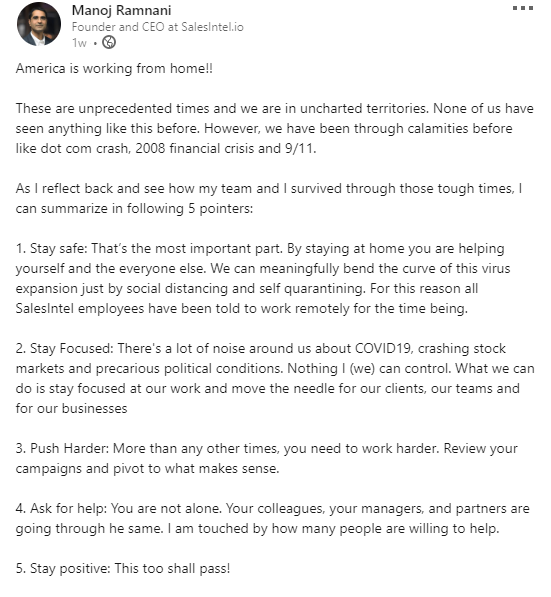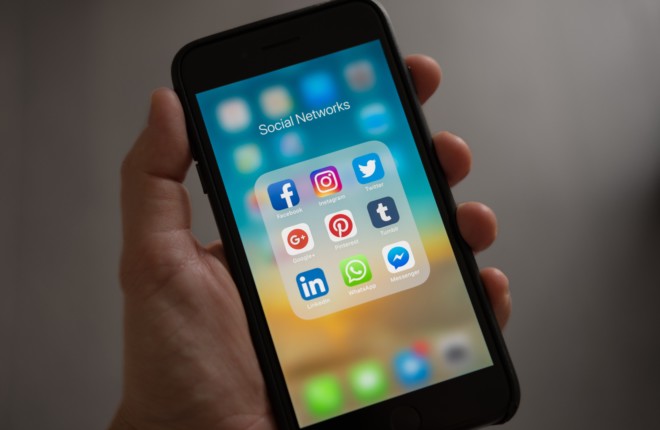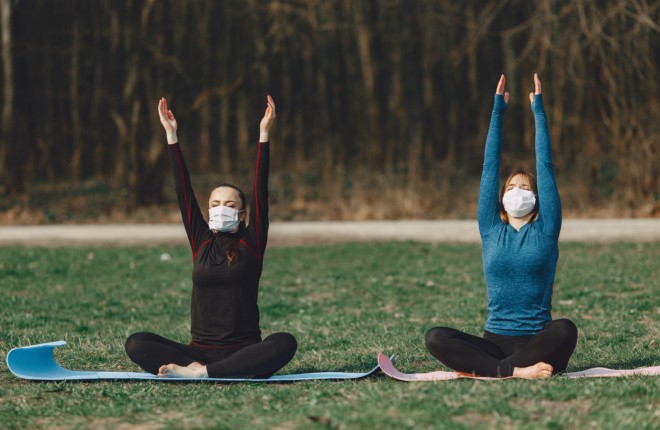With COVID-19 there’s so much information swirling around: how to stop it, correct hand-washing procedures, social distancing procedure, what to do if you get the virus and more.
Yet, besides health issues, there are professional challenges for businesses that are seeking to reduce the financial impact to their companies.
Although businesses are under pressure and even at risk of bankruptcy, the coronavirus pandemic also gives brands the opportunity to rise to the occasion and make a memorable impact.
The epidemic has, as predicted, not only affected website interaction rates but also social media platforms. Rival IQ data examining engagement rates from mid-February to early March reveals that interaction with most websites on all social media networks has plummeted alongside that of others.
Facebook has had a 13.5% decline rate in engagement rates. However, higher education brands are enjoying increased engagements due to the usefulness of content as educational institutions move classes and communication online.
Travel, sports, and hospitality brands have reported the sharpest decreases in interaction on Facebook and Instagram. One key finding of the data is that so far the only way to keep an audience interested is to generate corona virus-related material on Facebook.
Twitter has been peforming much better than Instagram and Facebook, with its focus on news. Over the last couple of years, brands have turned to Twitter and Instagram to develop an audience as both platforms allow digital relationships to be formed. In fact, both sites have been the home to most influencers, journalists, and media personalities.
Twitter handles are blazing with the freshest news reports on the epidemic at the moment. Its algorithmic displays have hampered the freshness and instant access to updated news content on Instagram and Facebook. As a consequence, Facebook is arguably the most interactive site.
Higher education and media brands earn the highest support from readers on Twitter because they are a significant source of vitally relevant knowledge for the public.
Instagram’s engagement rates have plummeted to the lowest of all other large networks. There has been a fall in participation level for the video and picture sharing website. Social media users have turned for social communication to Facebook, and for news alerts to Twitter.
Yet, non-profits and media brands on Instagram have been trending the most since their content is relevant to the ongoing epidemic. Instagram’s worst-hit brands are at sports, leisure, travel, apps, and technology.
When the Subject is Sensitive, Be Careful Before You Post
There are a few brands that tried to take advantage of this severe situation and faced criticism from their social media audience.
Case 1
A marketing agency promoted an ad on a Perfect High Five when the world was promoting social distancing. The ad describes that it feels good when you give a co-worker a really good high-five. On social, people have been critiquing the ad for running in light of people practicing “social distancing” during the virus.
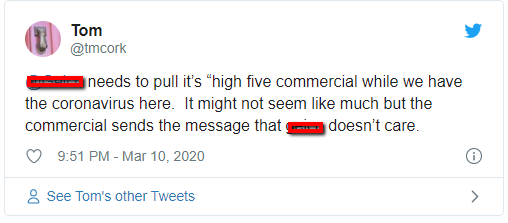
Case 2
A company recently launched a ‘fashionable mask’ in a tweet and promoted it by saying, “Festival season/flu season/dealing with close-talkers, meet your fave new year-round piece.” Maybe they could have been fashionable a few months ago…maybe, but now?
The brand even started promoting offers.
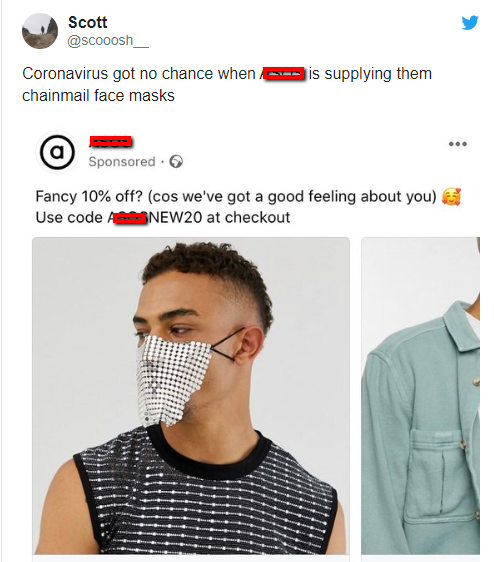

Case 3
A well-known cleaning brand was the top performer in terms of selling spray sanitizers. But with all the outages of the brand’s wipes and sprays in stores and online, current ads are coming under fire as people cannot easily purchase its products, and for some, seems insensitive.
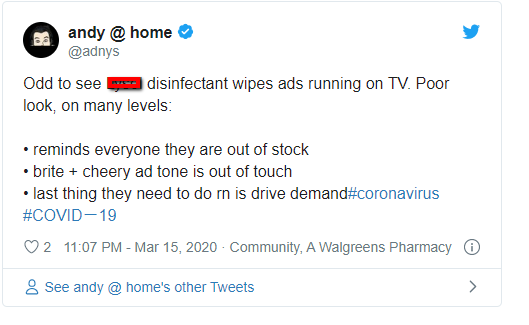
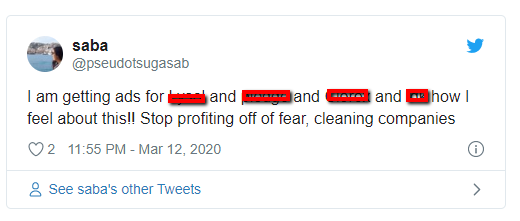
Case 4
Even the most popular brands faced complaints. A famous food and beverage brand with global outlets had to remove their ad and primary slogan. On social media and billboards, people were shown licking their fingers with the words “It’s” and “good” positioned around them. The Advertising Standards Authority in the U.K. told Ad Age that it had received 163 complaints about the ads of food and beverages.

Later the brand stopped the campaign saying, “It doesn’t feel like the right time to be airing this campaign, so we’ve decided to pause it for now—but we’re really proud of it and look forward to bringing it back at a later date.”
Some of the above examples are a mix of poor taste, bad timing or brands that just can’t catch a break. Yet, we must be aware of the new atmosphere that covid-19 has created and how this new context alters the intended perception.
- Be very careful and post content that doesn’t turn out to be uncomfortable in view of the current epidemic and social distancing strain.
- Post fewer updates when the opportunity calls for it as there is less interest among fearful readers. You should be empathetic about your content.
- Develop content that generates trust through long-form campaigns and projects. The best way to go now is via long-form video, podcasts, films, movies, essays, training material, and posts.
- Work on your social listening skills. Know what social media users are talking about and address around it.
While these are some quick tips, let’s look at some more to ensure you are taking the safest approach on social media.
Listen First, Then Respond.
The coronavirus pandemic causes customers to experience mixed feelings and leaves them confused about how to think or feel. Every pandemic reaction is characterized by an equal and opposite reaction.
It’s more important than ever that brands listen first, then reply with sensitivity with regards to an anxiety-provoking topic.
Communicate About Prevention And Donation
Let the audience know about the precautions you and your team are taking. Announcing the donations in terms of, say medical supplies or other necessary things. In any other season, this approach may backfire but in the current scenario, this could contribute to building trust and loyalty towards the brand.
These initiatives have been received with a lot of enthusiasm from the global community.
This change ensures that they will spend on the brand that stood with them during the epidemic until customers can spend the money.
Connect With Trustworthy Organizations
Brands will also be careful about partnering with companies and brands that have a poor reputation on social media.
To prevent the misuse of funds intended for pandemic victims, businesses collaborate with other firms within a close circle of confidence in order to avoid any public backlash.
Address The Outbreak But Don’t Be Too Salesy
Businesses may create social posts or email marketing campaigns that address the outbreak. However, advertisers should steer away ads that are too salesy, and then seek to be supportive.
For example, hospitality and travel-based companies serving the corporates may write to their clients about their hygiene and safety procedures, fee reductions, or relaxed cancellations.
Use The Right Tone
Social messaging that’s tone-deaf and ignorant of the current epidemic might turn some of your clients off or completely turn them against you. National sentiment is at its peak, and brands must respond to that aspect with their messages of support.
Do Not Exploit The Situation
Even if you are offering something in high demand, say toilet paper for some odd reason, resist the urge to jump on the bandwagon. Businesses that are advertently or inadvertently taking advantage of the public may find themselves in trouble during the epidemic. Worse, they could lose loyal customers and brand reputation.
Final Thoughts
The coronavirus pandemic represents uncharted commercial territory. At several levels, businesses are being confronted by customers asking questions not just about their ads, but also about their core values, how they handle their staff and factory workers, and how they contribute to the cause.
As a responsible B2B data partner, we would appeal to everyone to stay safe at home and stay productive.
Message from Our Founder –
